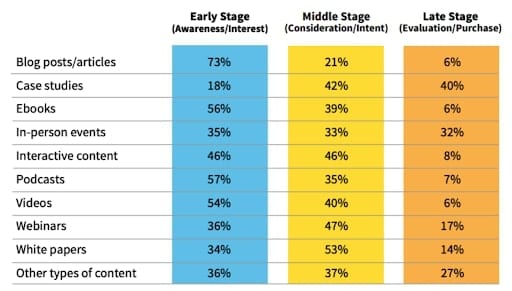By now, us savvy marketers know the big statistics around marketing videos to consumers:
- Nearly 50% of internet users look for videos related to a product or service before visiting a store – Hubspot
- 65% of executives have gone to the marketer’s site and 39% have called them on the phone after watching a marketing video. (Forbes)
- 52% of marketers say video is the type of content with the best ROI. (HubSpot)
- 64% of consumers will make a purchase after watching branded videos on social platforms. (Tubular Insights)
- Video is expected to make up 82% of internet traffic by 2021. (Cisco)
These stats make perfect sense to me – our brains are hardwired to prioritize information emanating from moving images and sounds over static images – thanks Evolution!
As a marketer whose arch of experience bends toward lead generation, I have found video to be a useful mid-funnel tactic. This is especially true for brands with products/services that are hard to describe in short bursts of text impeded by character limits. As of late, I’ve been testing video remarketing on both YouTube and LinkedIn and I have been surprised by the quality of leads generated by LinkedIn remarketing videos. There are several data points that surprised me when compared to YouTube, so I’d like to share a few. As always though, you should run a test for your own brands – don’t just take my word for it!
Testing Video Ads on LinkedIn and YouTube For a B2B Brand
For context, the following data is from a B2B SaaS client and represents a 3-month span. Audiences for both YouTube and LinkedIn are website visitors from the previous 30 days. The videos are “Explainer” videos. They’re short (30 seconds or less) and call out specific attributes of the product and show how they’re used. As a side-note, SaaS products are excellent candidates for video marketing because it’s hard to visualize software without actually being able to see it. The explainer videos can function as pre-demo, demos. This can also hold true for any product that has complicated features or a long sales cycle.

LinkedIn has a reputation for being costly for marketers, so I was at first surprised by the slightly lower CPVs that Linked had over YouTube. My ads also served a lot more to LinkedIn viewers over YouTube – this implies that LinkedIn is a better place to engage my target audience. Further confirmation of strong LinkedIn video campaign performance comes from the much higher view rates compared to YouTube. Users from LinkedIn were also 3% more likely to visit my client’s website after viewing. While clicks are not a core KPI of video campaigns, it’s always valuable to get a person off of a platform and over to a website. The intent behind that action is incredibly strong. The only YouTube video stat that bested LinkedIn was the completion rate.
I was pleased to see the in-platform stats for LinkedIn’s video remarketing, but the coup de grâce for YouTube was the post-conversion data for LinkedIn. Over this period, the explainer videos generated $158K in Opps for my client’s sales team. For transparency, investment was less than 1% of this.
I found it productive to run video as a mid-funnel strategy, but here is some additional content from LinkedIn on which stage in the buyer’s journey that video is most effective for demand gen:

Given our industry’s hard turn toward video and the potential for big returns, it should be a no-brainer to invest in the medium and to test videos across multiple platforms. Given the results of the test above, I’d recommend that if you’re managing B2B advertising, you start video testing on LinkedIn.




